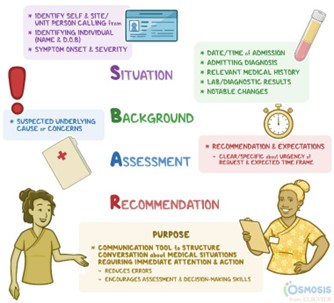A charge nurse in an acute care facility receives a client's request not to have particular assistive personnel (AP) care for her. Which of the following actions should the charge nurse take?
Document the issue on an incident report.
Address the concern with the assigned nurse.
Explain to the client the AP was having a bad day.
Notify the human resources department.
The Correct Answer is B
If a charge nurse in an acute care facility receives a client request not to have particular assistive personnel (AP) care for her, the appropriate action for the charge nurse to take is to address the concern with the assigned nurse. This will allow the charge nurse and the assigned nurse to work together to address the client's concerns and ensure that the client receives appropriate care.
Option A is incorrect because documenting the issue on an incident report may be necessary, but it should not be the first action taken.
Option C is incorrect because explaining to the client that the AP was having a bad day does not address the client's concerns or wishes.
Option D is incorrect because notifying the human resources department may be necessary, but it should not be the first action taken.
Nursing Test Bank
Naxlex Comprehensive Predictor Exams
Related Questions
Correct Answer is ["A","B","C","E"]
Explanation
SBAR stands for Situation, Background, Assessment, and Recommendation. It is a systematic method of communication that provides a structured framework for conveying important information about a patient. To ensure that the report is thorough, the nurse needs to include information about the situation of the patient, the background leading up to the situation, an assessment of the patient, and recommendations for moving forward.
Option d is incorrect because barriers to providing treatment are not part of the SBAR framework.
Option f is incorrect because the reason why the report is needed is not part of the SBAR framework.

Correct Answer is A
Explanation
If a nurse manager notices that a nurse who has a history of being resistant to change is not delivering care according to a new policy, the appropriate action for the nurse manager to take is to encourage the nurse to verbalize the reasons for their resistance to the change. This will allow the nurse manager to understand the nurse's concerns and work with them to address any issues and facilitate their acceptance of the new policy.
Option B is incorrect because ignoring the resistance and allowing peer pressure to facilitate a change in the nurse's behavior is not an effective or respectful way to address the issue.
Option C is incorrect because explaining the importance and rationale of implementing the new policy to the nurse may be necessary, but it should not be the first action taken.
Option D is incorrect because indicating that there will be disciplinary consequences if the nurse does not implement the new policy may be necessary, but it should not be the first action taken.
Whether you are a student looking to ace your exams or a practicing nurse seeking to enhance your expertise , our nursing education contents will empower you with the confidence and competence to make a difference in the lives of patients and become a respected leader in the healthcare field.
Visit Naxlex, invest in your future and unlock endless possibilities with our unparalleled nursing education contents today
Report Wrong Answer on the Current Question
Do you disagree with the answer? If yes, what is your expected answer? Explain.
Kindly be descriptive with the issue you are facing.
